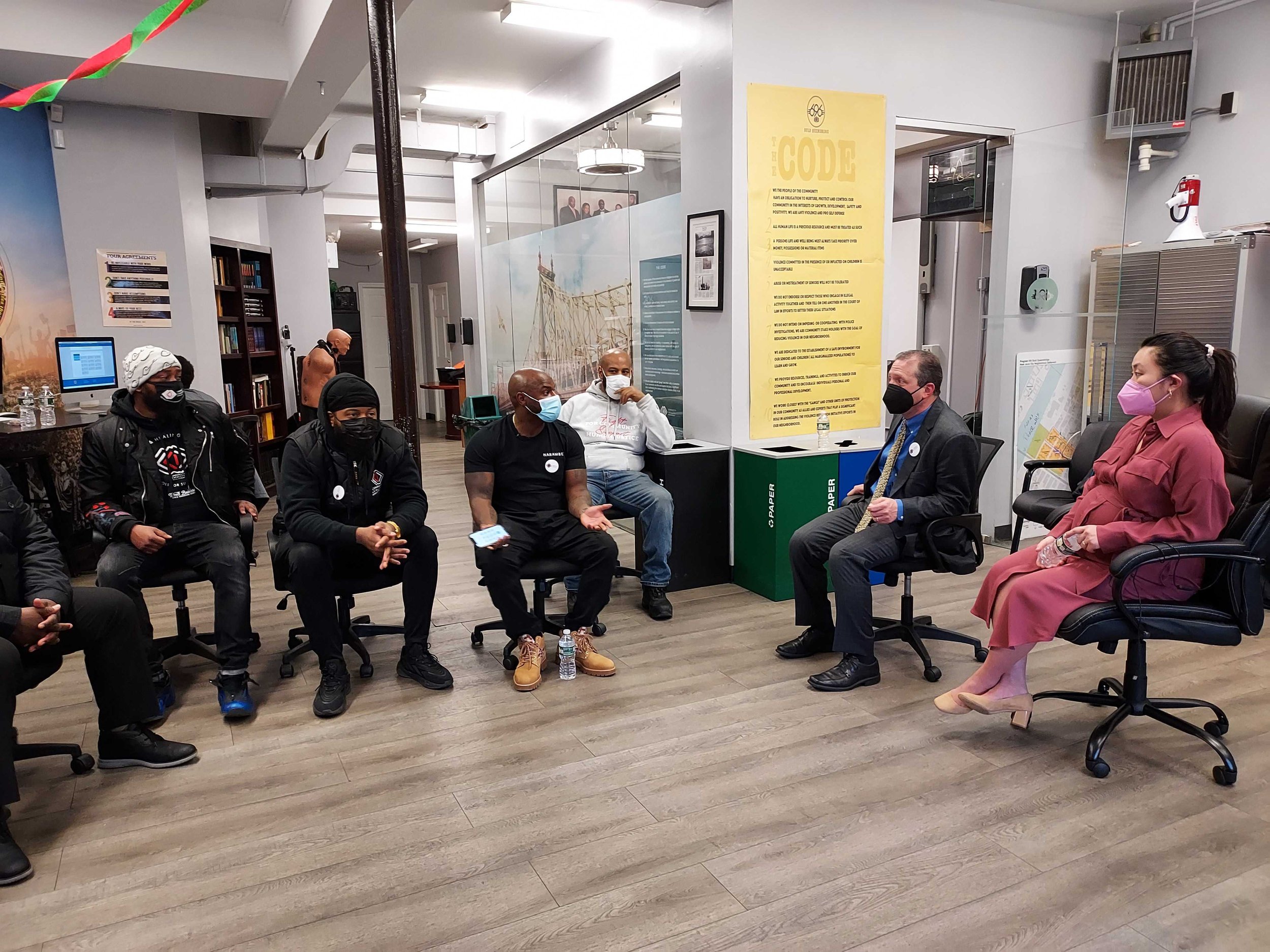Lander, Won meet with Queens nonprofit to talk city procurement
/K. Bain (third from left) meets with New York City Comptroller Brad Lander (second from right) and City Councilmember Julie Won (right) to discuss the city’s nonprofit procurement process. Photo via Won’s office
By Jacob Kaye
City officials visited a nonprofit in the Queensbridge Houses Wednesday to pledge that community groups that contract with the city won’t have to jump through hoops to get paid any longer.
New York City Comptroller Brad Lander and Queens City Councilmember Julie Won met with K. Bain, the executive director and founder of Community Capacity Development, and several of his employees, to discuss the ways in which the city’s procurement process has hampered nonprofits in the past and how it can be made better.
“The process of contracting with the city of New York feels like you're being punished, it feels like you're not trusted,” Bain said. “I'm not saying it's intentional but that's the feeling that we get.”
The meeting followed the release of a report, titled “A Better Contract for New York: A Joint Task Force to Get Nonprofits Paid On Time,” from Lander’s office, that examined areas of improvement in regards to the city’s contracting process with community-based groups like Bain’s. In addition to not getting paid on time, nonprofits have reported feeling locked out of the procurement process and unsupported in the long term.
“I think sometimes the way people look at the human service in the nonprofit groups is it's like people with a handout – you're looking for a grant, as opposed to [thinking] this is a core service that the city believes is necessary for the goals we have,” Lander said. “The systems are built so that contracting out is something that we want to gatekeep.”
In fiscal year 2022, three quarters of the nonprofits that contracted with the city were “forced to take out loans and incurred substantial costs to keep their organizations afloat, putting themselves - and the New Yorkers that they serve - at risk,” as a result of not getting paid on time, according to the report.
Securing a contract with the city can be an arduous process for small, community-based groups already short on resources. Once providing the services they were contracted to provide – the city procured $12 billion in human services contracts last year – nonprofits desperately need the cash they were promised, according to Bain.
“When you talk about certain populations in New York City, while others will be hurt and harmed by the process, we are devastated [by lack of payment],” Bain said.
It’s a matter of equity, Bain, Lander and Won said.
“We have to understand that there are groups that are more challenged, who have been more oppressed, who have suffered more, who will need to have more resources given to them at this time, because we're not starting on a level playing field,” said Won, who chairs the council’s Committee on Contracts.
Bain, who is Black and operates in a majority Black community, cited multiple times in which he felt he was treated differently than leaders of organizations led by white executives. He’s been asked to justify indirect costs to the city, a practice his white counterparts haven’t had to do. He also noted that organizations led by people of color could have a more difficult time securing a loan from a bank, in the instance where the city doesn't pay up, than organizations led by white executives.
There are also major language barriers, the councilmember said.
The city recently rolled out PASSPort, a new digital procurement portal that was designed to bring the contracting process into the 21st Century. However, the program is only available in English.
“There's multiple layers that are rooted in inequity,” Won said.
The comptroller’s report makes nearly 20 recommendations to the mayor’s office to improve the nonprofit procurement process. The recommendations touch on issues including equity, efficiency, transparency and capacity.
Among the recommendations is a plan to reimburse the interest on private loans nonprofits have to pay when their check from the city is delayed. Lander’s office also recommended establishing a training program to help nonprofits learn about the procurement process.
“I'm excited about what the task force was saying in this report about focusing on making sure that these organizations and these small groups are empowered,” Bain said.
Bain’s meeting with Lander and Won wasn’t the first time he’s been able to share his organization’s needs with elected officials this month.
At the start of the month, President Joe Biden visited P.S. 111 in Long Island City, where Bain has helped to establish a community capacity building program that also aims to reduce violence.
Biden’s trip to Queens was part of a tour of the city spurred by Adams’ request to unite multiple levels of government around tackling gun violence in New York.
Bain’s violence interruption program is one of the most successful in the city, according to city officials. In 2016, Queensbridge, the largest public housing complex in the United States, didn’t see a single murder. It was also the first full year of work for Bain’s program.
And while Bain’s program works to deescalate conflicts in process, it also provides a flurry of social services in an effort to address the root causes of the violence.
“We are an anti-racism, anti-poverty, anti-health disparity organization –that's what we are,” Bain said. “We're called anti-gun violence, because violence is the byproduct of all of that oppression.”
Changing the city’s procurement practices will be an ongoing process, Lander said. Following the report, meetings like the one held Tuesday, are what Lander said is “phase two” of the process.




